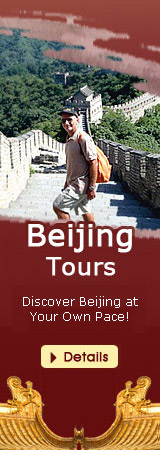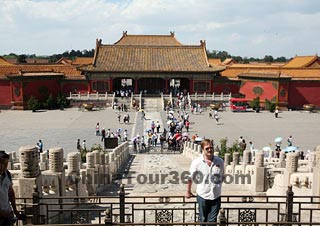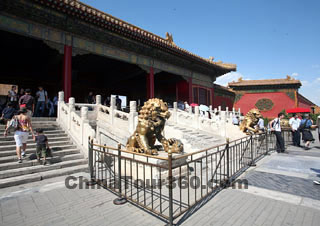Gate of Heavenly Purity (Qianqingmen)
As you through the Gate of Heavenly Purity (Qianqingmen), you will step into the inner court of the Forbidden City. The Gate of Heavenly Purity is the main entrance to the inner court and the only way to the imperial palace where the emperor, empress, concubines, princes and princesses lived. During the Qing Dynasty (1644 - 1911), emperors usually held court in the morning at this gate.
|
|
In the Qing Dynasty, the emperors would call on the ministers and officials to pay their respects and to discuss the state affairs at the Gate of Heavenly Purity. Since this was always held in the morning, it was also known as ‘Morning Court’. The emperor usually presided at the gate every few days or once a month. However, Emperor Kangxi, the most diligent emperor among the emperors in the Chinese history, held court everyday for over 50 years.
On the east and west sides of the square in front of the Gate of Heavenly Purity are the Gate of Great Fortune (Jingyunmen) and the Gate of Thriving Imperial Clan (Longzongmen) respectively. Gate of Thriving Imperial Clan is an important gate close to where the emperor lived. No one, including the princes and ministers, was allowed to enter the Gate of Thriving Imperial Clan except due to emergencies or summons from the emperor.
Office of Grand Council (Junjichu)
Close to the Gate of Thriving Imperial Clan is the Office of Grand Council (Junjichu). This was a temporary institution established by Emperor Yongzheng to deal with the military affairs surrounding the rebellion in northwest China in 1729. The officials in the office were all trustworthy and influential in the emperor’s court. They worked 24 hours a day and had great power.
The organization of the Office of Grand Council was a move to enhance the centralized power, symbolizing the Centralization of Monarch Power had reached its climax in Chinese history. Thereafter, the Cabinet was used only for some routine affairs. All of the secret and important state affairs were put under the Office of Grand Council which grasped both the political and military power. As a result, the Office of Grand Council became the superior state body under the direct control of the emperor, and was equal to the emperor’s personal secretariat.
There were three reasons Emperor Yongzheng created the Office of Grand Council. First, the military affairs in northwest China needed to be dealt with as soon as possible in order not to disrupt the military plan. Due to this fact, Emperor Yongzheng had to concentrate the state power. Second, the Cabinet, in the southeast corner of the Forbidden City, was far away from Hall of Mental Cultivation (Yangxindian) where Emperor Yongzheng lived. When there were military emergences at night, the emperor could not call in the officials together to discuss strategies. Third, there were too many people in the Cabinet, and military secrets may be leaked easily.
Later, the functions of the office were some kind of changed over time. The current Office of Grand Council is now an exhibition hall displaying the historical materials. Tourists can gain a better understanding of the Office of Grand Council of State here.
![]() Go to the Next Attraction: Palace of Heavenly Purity
Go to the Next Attraction: Palace of Heavenly Purity










